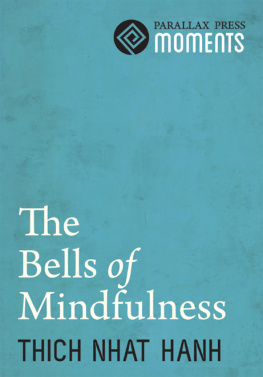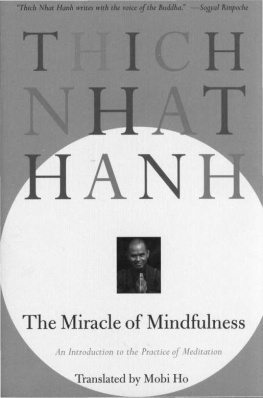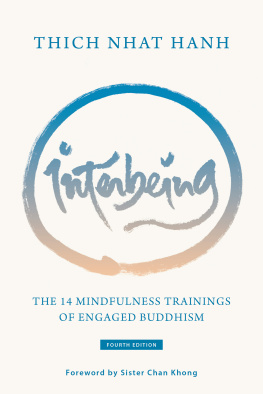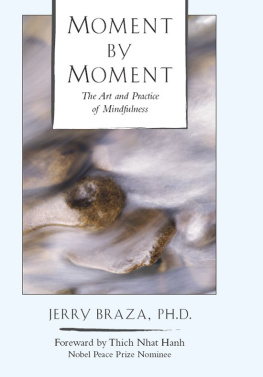ADVANCED PRAISE FOR NOT QUITE NIRVANA
This is a fresh, lively, warm, interesting and valuable book! You will be happy to add it to your library.
Sylvia Boorstein, author of Happiness Is An Inside Job:
Practicing for a Joyful Life
Not Quite Nirvana will resonate with anyone who has ever tried to juggle more than two things at once. Its an important and joyful book, one that left me comforted, refreshed, and inspired to go out and add more kindness to the world.
Tirien Steinbach, Faculty, Berkeley Initiative for
Mindfulness in Law
Rachel Neumann brings wonderful insights to the practice of meditation and what it means to weave it into our everyday lives. This is a great book, one that can help us find balance as well as a sense of peace and clarity in the midst of it all.
Sharon Salzberg, author of Real Happiness and
Lovingkindness
NOT QUITE
NIRVANA
A SKEPTICS JOURNEY TO MINDFULNESS

RACHEL NEUMANN
Introduction by Thich Nhat Hanh

To Thay, for being available
To Yeshi, who embodies full engagement
And to Osha, the most compassionate of skeptics
Contents
THICH NHAT HANH
OVER THE PAST TEN YEARS, Rachel Neumann has edited more than twenty of my books. Thanks to her profound understanding of my teachings, style, and voice, my message has been communicated clearly, correctly, and authentically to thousands of readers. I am deeply grateful for her skillful work and dedication. Over the course of that time, she has learned this critical lesson: Do not get caught in the form of a teaching, but let the heart of your own understanding guide your path. In Not Quite Nirvana, Rachel passes on the crucial lesson that your best teacher is your own mindful awareness.
In the Sutra on Knowing the Better Way to Catch a Snake, the Buddha said,
When a mountain stream overflows and becomes a torrent of floodwater carrying debris, a person who wants to get across might think, What is the safest way to cross this floodwater? Assessing the situation, he may decide to gather branches and grasses, construct a raft, and use it to cross to the other side. But, after arriving on the other side, he may think, I spent a lot of time and energy building this raft. It is a prized possession, and I will carry it with me as I continue my journey. If he puts it on his shoulders or head and carries it with him on land, do you think that would be intelligent?... I have given this teaching on the raft many times to remind you how necessary it is to let go of all the true teachings, not to mention teachings that are not true.
Rachels journey is full of unabashed appreciation of the joys and sorrows of everyday life. It is also a story of finding a little more peace with aging and death. Many people are afraid of aging; some are even more afraid of aging than of death! But I have found that old age is something very delicious. You are calmer, you go more slowly, and you enjoy much more than when you are very young. You dont rush. You take your time. And you taste every moment of your daily life.
Aging can also give you practice in having the courage to face your eventual death. When you practice acknowledging your fears, you become aware you are still alive, that you still have so many things to treasure and enjoy. Then you will know how to act to make people happy. Wherever you go, you will carry the happiness of a lot of people with you. You will be able to enjoy the sunshine, the fog, the air, the water. Confucius said, If you dont know how to handle your life, how can you handle your death? If you can look deeply into death, and see the birthless and deathless nature of you and me and all phenomena, then you will really live a life that is worthwhile.
In this moment, there are many cells dying in me and in you. We dont have time to organize funerals for them; there are so many of them dying. Many new cells are also being born; we dont have enough time to celebrate their birth. Death cannot be without birth. The death of something is also the birth of something. Not Quite Nirvana offers insights in how to live fully each day with this knowledge. Amidst all the busyness and chaos, it is possible to celebrate the myriad possibilities of the present moment.
Thich Nhat Hanh
June 2012
I AM ON A SAGE-COVERED MOUNTAINTOP deep in the Southern California desert, walking past a small, green lotus pond. All around me, people are dressed in grays and browns, walking slowly, and speaking in whispers. Every few moments the ringing of a huge bronze bell fills the air and everyone stands still and silent, slight smiles on many of their faces, frozen in a tableau of serenity until the bell fades. I fill my lungs with the warm mountain air, trying to release the claustrophobic tightness in my chest. I look longingly at the dirt road that leads away from the monastery, desperate for a crowded bar, an old pool table, and an early-nineties hip-hop soundtrack. But the bell rings again. Now it is time for a silent lunch. Restraining myself from running or skipping, I walk as slowly as I can toward the dining hall.
Just two years earlier, in the fall of 2002, I was living in a fourth-floor Brooklyn walkup, extremely pregnant, and looking for a way to return to the San Francisco Bay Area. I was brought up on a rural California commune, surrounded by trees, mountains, rivers, and a roving gang of other dirty, half-naked children. Jason, my partner, grew up on a small family farm where he took care of goats, cows, and sheep. He fed them, groomed them, and, when it was necessary, helped them give birth. One of the best things about our dissimilar childhoods was the connection we both had to the earth and to close-knit community. We wanted our kids to have at least a little of those things.
At the same time, Zen Master Thich Nhat Hanh was looking for a Bay Area-based editor for his publishing house. Id interviewed Thich Nhat Hanh in New York a year earlier, just weeks after the World Trade Center attacks, and the interview had stuck with me. When I heard he was looking for an editor, I promptly went out and bought every one of his books I could find. I stayed inside for a week and read them all. Then I applied for the job. Within a few months, I was working full-time as his personal editor as well as editing the work of a number of other Buddhist teachers. I brought my baby to work with me in a sling and learned as I went along about Buddhism, mindfulness, colic, and how to function on two hours of sleep.
Clearly, I had a lot to learn. What, for example, was an equality complex, and how could that possibly be bad? How could one live in the present moment and still get anything done? What was with Buddhisms fixation on numbers? There was the one vehicle, two dimensions, three jewels, four noble truths, five mindfulness trainings, six paramitas, seven virtues, and the eightfold path. My head was spinning. Id thought Buddhism was about making things simple! Somehow, through it all, I was supposed to be paying attention to my breath. Unfortunately, every time I took a deep breath, I thought I might pass out from exhaustion.
I could have easily won a Buddhist trivia contest (Name the Buddhas first five disciples! How many hell realms are there? First prize winner gets a bowl full of emptiness!), but I didnt feel like I was learning anything that would help me get through the day. What I needed was a mindfulness practice, a way to translate what I was learning into body knowledge.
Next page






